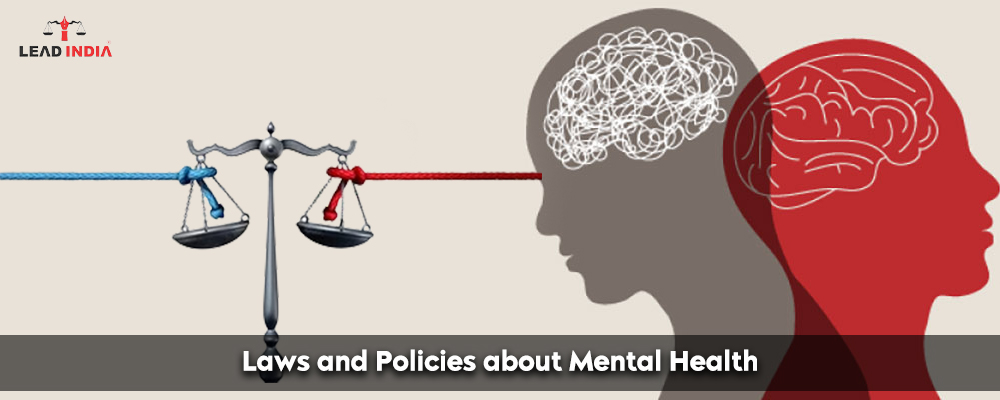The frequency of mental health concerns is increasing worldwide, owing mostly to demographic shifts. Mental health illnesses and substance use disorders have increased by 13% during the last decade, up to 2017. Depression is the most common cause of disability worldwide. Mental health issues, especially drinking, are prominent among the top 10 causes of disability in both industrialized and developing nations. These issues have an impact on every element of life, and they are frequently accompanied by stigma, discrimination, and abuse.
Mental health is essential for every person throughout their lives. Mental health also encompasses people with mental disabilities, as well as the care that they require. Mental health laws apply to everybody who suffers from a mental disease or impairment and requires treatment. In India, the word PMI refers to people suffering from mental illnesses or disorders. After the British took over the Indian administration in 1800, asylums for PMI were established.
Need A Legal Advice
The internet is not a lawyer and neither are you. Talk to a real lawyer about your legal issue

Mental Health Laws
Article 21 of the Indian Constitution stipulates that only legitimate means authorized by law may be used to seize someone’s daily life or individual liberty. According to Section 16 of the Voting Rights Act of 1950, an individual who has been determined by a court of competent jurisdiction to be unsound of mind is ineligible to register in an electorate. As a result, the candidate is ineligible to hold any constitutionally recognized governmental post, including those of the House of Representatives or Legislature.
There are various laws dealing with psychological health issues in India.
- The Mental Health Act of 1987: The goal of this Act is to adequately provide for the property and affairs of psychologically sick people, as well as associated matters, by consolidating and modifying the laws governing their treatment and care. In other words, the Act establishes procedures for psychological care and support for those suffering from mental diseases, as well as to advance and protect these individuals’ freedom while offering such treatment and help.
- The Protection of Human Rights Act, 1993: A statute establishing several national human rights institutions to properly protect fundamental rights. It also supports the initiatives of agencies and non-governmental organizations (NGOs) working on the same cause.
- Persons with Disabilities Act, 1995: According to this law, disabled people have the same rights as others, and the government is responsible for promoting their full participation in the community. The government is expected to offer free education and integrate special needs kids into mainstream schools.
- The National Trust Act of 1999: The National Trust was founded under the “National Trust for the Welfare of Persons with Autism, Cerebral Palsy, Mental Retardation, and Multiple Disabilities” Act and is an official institution of India’s Social Justice and Empowerment Ministry. It was established to carry out two primary functions: legal and welfare. Local Level Committees (LLC) and legal guardianship are employed to carry out legal requirements, and welfare obligations are addressed through a variety of programs.
- Protection of Women from Domestic Violence Act, 2005: Section 3 of this Act states that any type of behavior or conduct by the respondent that jeopardizes the victimized individual’s safety, life, body part, or wellbeing, whether mentally or physically, or by inflicting assault, physical molestation, abusive language, mental abuse, or financial abuse; or terrorizes the injured party to force her or any individual related to her, to fulfill the unethical demands for dowry or other valuables.
- Protection of Children from Sexual Offences Act of 2012: Part 5 provides for mental healthcare to address the mental health needs of children who have been abused.
- The Mental Healthcare Act of 2017 replaced the Act of 1987: The former Act prioritized the institutionalization of mentally ill persons over the preservation of their rights. Furthermore, the 1987 Act imposed burdensome and stringent licensing requirements for psychotherapists. The Act also provides that patients have the right to choose from a choice of mental health facilities. If certain services are not provided, a PMI may request reimbursement from the state. The law provides several rights, including social inclusion, privacy, access to health data, protection from harsh or inhumane treatment, and the prohibition of discrimination. All impoverished and vagrant PMI are eligible for free mental health therapy; nevertheless, it makes no distinction among PMI based on economic status.
Lead India offers free legal advice and online information, in addition to other legal services. We provide a forum to speak with a lawyer and ask legal questions. Lead India’s solicitors can help you with any legal difficulties. Lead India’s solicitors may assist you with any legal issues. Lead India also provides free online legal help in India. In addition to giving online legal assistance, Lead India allows users to ask specialist questions for free.





 Talk to a Lawyer
Talk to a Lawyer